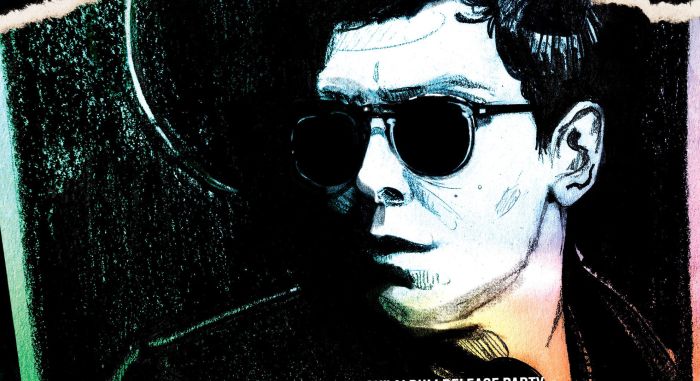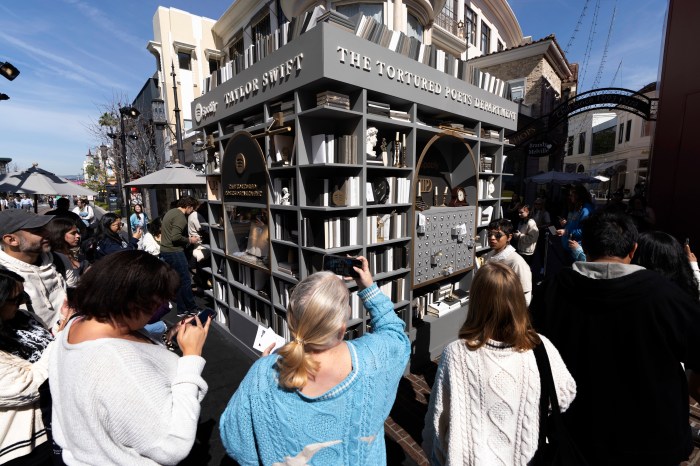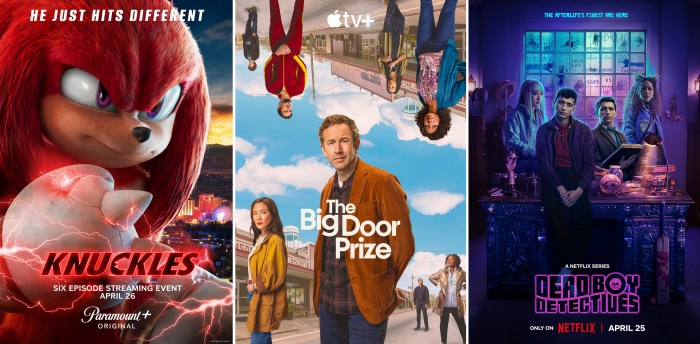Jodie Foster says she loved last year’s Oscar-nominated “The Big Short” — not in spite of its ambiguity, but because of it. “We all know the financial market, on purpose, is arcane and impossible to understand,” she said in New York recently. “ ‘The Big Short’ was trying to show you how impossible it is to understand.”
“Money Monster” has a different objective. “It’s a story about people,” the actress-director said of her new thriller, which is also a parable about the dangers of live TV. One night, Jim Cramer-inspired TV investment guru Lee Gates (George Clooney) has his program hijacked by a gun-wielding suicide bomber named Kyle (Jack O’Connell). Kyle, it seems, has taken Lee’s advice and lost his shirt. While Lee’s producer Patty Fenn (Julia Roberts) tries to keep her boss alive from her perch in the control room, corporate mouthpiece Diane Lester (Caitriona Balfe) tries to track down her boss, tycoon Walt Camby (Dominic West), and find out how some $800 million in company funds have disappeared — including the money invested by Kyle.
Kyle, too, would like to know what happened. So would we all.
“Monster” is a lesson in high finance and felonies, but it’s also a hostage-situation movie, one in which the New York Police Department comes off looking a bit trigger-happy: Someone proposes having a sniper shoot the detonator off the vest that Lee has strapped on at Kyle’s, shall we say, request. “We have an 80 percent chance of an 80 percent chance,” an officer tells Capt. Marcus Powell (Giancarlo Esposito), weighing the odds of a bullet not hitting Lee — and then having him survive if it does.
“The chances of a police sniper pulling off such a shot would be much higher, like 100 percent, if it were that distance and that well-lit,” Foster said when asked if any such scenario were possible. “It’s not a crazy idea. It’s a little insane when you see the film. But it’s not a crazy idea.”
What’s crazy, she said, is the “messed-up situation” that Kyle shines a light on with his rash, suicidal act. But that wasn’t her primary motivation for making the movie.
“I’m not really a political person and I’m not that interested in making movies that are political,” Foster said. “The goal, the thing that really interested me, was using the financial world as a backdrop to explore these characters and technology in the modern world.” It’s a play, she said, involving three people — Kyle, Patty and Lee — in which the most private details of their lives get revealed and the whole world gets to watch.
This includes George Clooney sitting on a toilet.
“I didn’t want to open the movie on the biggest movie star in the world’s face,” Foster said. (The first shot of Clooney is actually the back of his head.) “It was important for me to portray Lee as someone who’s a cog in a machine, that he’s allowing himself, his persona, to be manipulated. And he accepts that. You understand he’s a puppet. Really, the first time you really see George is when he’s sitting on the toilet. That’s the real introduction. God love him, he embraced it, he loved it, and that was his first day of shooting and he was happy to do it.”
“Money Monster” marks the fourth feature that Foster — who was in New York for the 40th anniversary celebration of “Taxi Driver” at the Tribeca Film Festival — has directed. The others were “Little Man Tate” (1991), “Home for the Holidays” (1995) and “The Beaver” (2011), that strange, underappreciated film starring her close friend Mel Gibson. (She has also directed episodes of “House of Cards” and “Orange Is the New Black”). In a Hollywood under siege for its neglect of female directors, Foster is an anomaly, for a couple reasons.
“I always have to say, ‘Look, I was given opportunities, which is why I don’t count,’ ” the former child star said about the female-director debate. “I was given opportunities by wonderful men who were my guys, they knew me, they worked with me, they had a good experience with me, and said, ‘I’m going to give you an opportunity, and not only am I going to give you an opportunity on your first movie, which probably won’t make any money, but I want to extend my hand because I want to work with you on your second movie and third movie and fourth movie.’
“So I’m not really a good person to talk to, because I was already in the business — in the boys club, if you will.”
She said it’s a “complicated issue” that may have become “oversimplified.”
“It’s changed in the television arena,” she said, “and a lot of women are doing independent features and there have always been a lot of women directors in Europe. But it hasn’t happened with mainstream films and distributors here.
“And what’s happened now,” she continued, “is that we’re at probably the most risk-averse time in movie history. And the weird problem is women directors are still seen as risks. It’s like race psychology — we’re still in a profiling phase, studios are scared for their lives, they have millions of screens across America and they’ve worked themselves into a place where they only trust making $200 million movies about blowing up space people.
“It’s a weird time in the film business.”
Money, money, money
Sex sells, but money is a pretty sure bet at the movies, too. If there were a film called “Fifty Shades of Cash” it would probably rake in a trillion dollars. That being said, the following movies were mostly about money, people who made it, people who spent it, people who stole it and people who went to prison (or should have). They are a mixed bag — the bag being full of filthy lucre.
WALL STREET (1987) A movie quite definitely of its time, this Oliver Stone classic tapped into Reagan-era avarice, insider trading, arbitrageur-ship and delivered some indelible catchphrases (“Greed is good”) as well as some of the more distinctly prosciutto-scented performances in movie history. Don’t even mention the sequel.
ENRON: THE SMARTEST GUYS IN THE ROOM (2005) Alex Gibney’s stylish, gripping Oscar-nominated documentary is about corporate corruption at its most venal, arrogant and shocking — albeit a real-life case in which the offenders eventually got what they deserved. Based on the book of the same name by Bethany McLean and Peter Elkind.
I.O.U.S.A. (2008) Patrick Creadon’s documentary examines all the reasons why the United States just might go broke in our lifetime — aging baby boomers, strained entitlement programs, an astronomical defense budget and excessive national debt. Not the feel-good movie of 2008, but thought-provoking.
ARBITRAGE (2012) Director Nicholas Jarecki’s thriller with a moral stars Richard Gere as Robert Miller, a hedge-fund manager desperately trying to cover up his accounting improprieties so he can sell his company and get away clean. There are suggestions of Bernard Madoff, although as Gere once told this writer, “Robert Miller’s not a sociopath and Madoff was. But the people around him [Miller] who were not sociopaths, they’re more interesting. The ones who knew, who took the money and said to themselves, ‘This can’t be true’ — those are the more interesting people to me.” Miller, he said, is one of those people who think of themselves as good guys, “winners who can never lose.”
THE WOLF OF WALL STREET (2013) A movie about excess in which one of the bigger offenders is director Martin Scorsese, who seems to get carried away in portraying the Gilded-Era-plus lifestyle and pagan morality of Jordan Belfort (Leonardo DiCaprio), who made millions in his 20s defrauding investors and becoming king of a dubious kingdom. Like Belfort’s life, the movie’s fun for a while, because Scorsese treats Wall Street like the Mob.
— JOHN ANDERSON

















